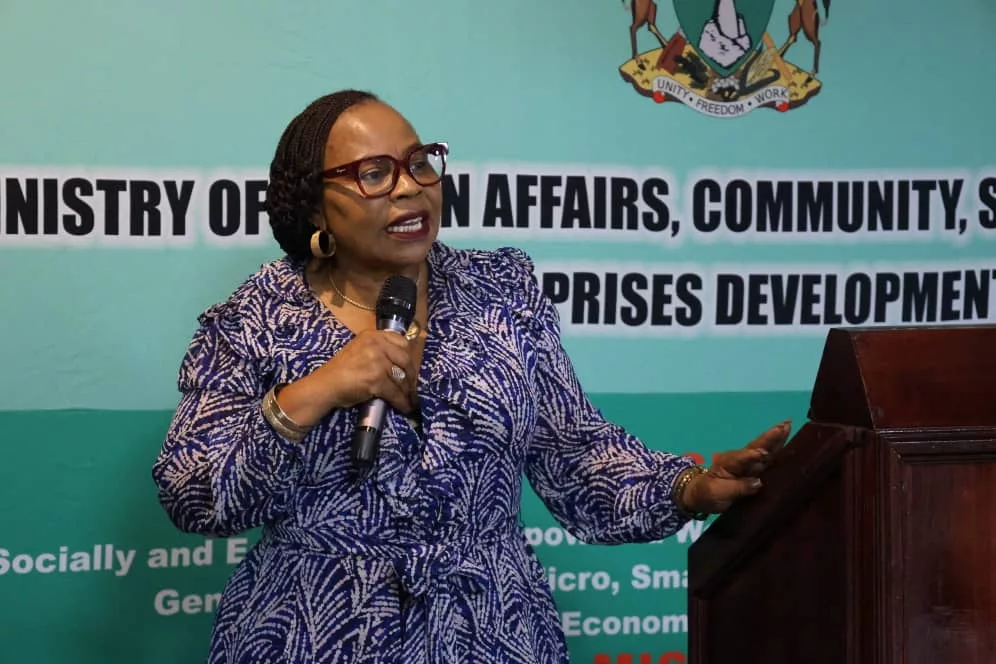|
Getting your Trinity Audio player ready...
|
The Church holds a unique and powerful position that strategically positions it to be able to address the pervasive issues of Gender-Based Violence (GBV) since its roles allow it to influence attitudes, challenge harmful norms, and provide support to those affected by violence, Hon. Senator Monica Mutsvangwa, Minister of Women Affairs, Community, Small and Medium Enterprises Development has said.
This emerged at the training of female religious leaders on GBV response at the Holiday Inn Hotel in Harare on 11 December 2024.
“This training workshop is not providing a platform to learn only but also to empower each other through the sharing of experiences. As women religious leaders in our faith communities, you hold a unique and powerful position that strategically positions you to be able to address the pervasive issues of Gender-Based Violence.
“Your roles allow you to influence attitudes, challenge harmful norms, and provide support to those affected by violence. Your voices carry weight, and your actions can inspire change. As such your involvement is crucial in addressing this vice,” Hon Mutsvangwa said.
The Minister said Gender-Based Violence is not about reading statistics in the media and other sources. It is a lived reality that many women, girls, men, and boys face in everyday life.
These individuals affected require support services and compassionate and informed responses that acknowledge their dignity and worth as individuals. GBV leaves deep scars on individuals and the church must be equipped with the relevant skills to help survivors navigate through these difficult situations.
Gender-based violence is a profound violation of human rights and it affects millions of individuals worldwide, Zimbabwe included. The vice transcends cultural, economic, social, and political boundaries impacting families and communities at large. The statistics are staggering: one in three women experiences physical or sexual violence in their lifetime. Global statistics indicate that one in every three women face GBV and for Zimbabwe, the figure is above that of the global world with almost 1 in every 3 women experiencing GBV.
“These numbers symbolize the women that we interact with in everyday life some of whom are suffering in silence because they can’t speak out. The faith community has for some time maintained a culture of silence on matters of GBV and attributing the acts to evil spirits. It is now time to critically reflect on these positions that have been taken and ask ourselves the pertinent questions of whether we are doing a service to survivors who are suffering in silence.
“We now need to come up with practical solutions to these challenges and help each other to come out of this vice. The Bible does not condone GBV in any way but some unscrupulous individuals want to use the Bible to justify violence against women and girls. The Bible tells women to be submissive to their husbands and there is nowhere it says to abusive husbands and in the same verse it tells men to love their wives as Christ loved the church. Therefore you cannot harm something that you love, instead, you cherish and protect it,” Hon Mutsvangwa said.
Turning to women, she said the challenge of GBV is not only affecting congregants but even female church leaders might also be victims of the vice.
“Your situation becomes even more pathetic as your positions force you to be mum on issues like these. Every time you encounter violence and you want to speak out, you find yourself asking his question “What then will the congregants say when they hear that I am going through this kind of violence?” You then are forced into perpetual silence and sometimes assisting fellow women with the challenges that you are facing at home. It is time to shake away the feeling of shame and confront these challenges with determination to ensure we create a generation that maintains zero tolerance for GBV.
“As leaders from the various churches that you come from, you interact with your congregants regularly, and this positions you as the first people to interact with survivors from your church and in the community because people have so much faith in you. This makes your role key in providing not only immediate support but also in guiding survivors toward long-term recovery. You can provide safe spaces for survivors to share their stories and seek help that will promote healing, compassion, and justice.
“Together, we can build a network of support that extends beyond this workshop but transcends into our respective communities. Let us commit to being champions for change, advocating for the rights and dignity of all individuals in our communities that way we set ourselves on the right path to ending GBV,” Hon Mutsvangwa added
In his solidarity remarks, Bishop Patrick Mahachi of the African Apostolic Church led by Bishop Paul Mwazha, said the involvement of male church leaders in addressing GBV is crucial.
“As church leaders, we must teach fellow men to treat women as partners. the Bible said that God saw it fit to provide a Man with a Helper – a Woman made from his rib. Fighting a woman is like fighting yourself. We need family unity in which all members – whether male or female support, love, and comfort each other. God is love,” Bishop Mahachi said.
The workshop equipped female church leaders with the knowledge, resources, and skills necessary to respond effectively and sensitively to GBV cases, ensuring that survivors receive the support they need. It was also a learning opportunity through sharing experiences and participants tapped into each other’s expertise and knowledge.






